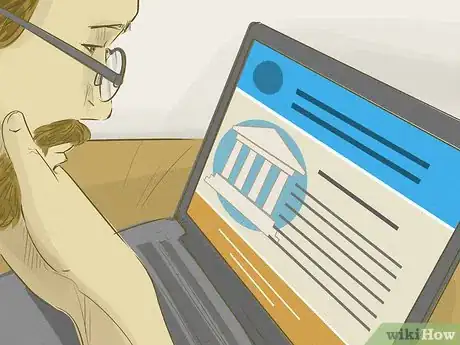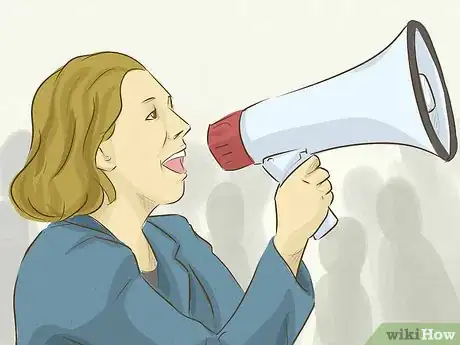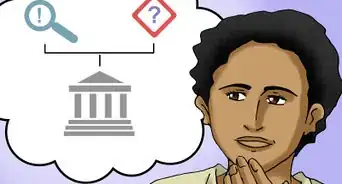This article was co-authored by wikiHow staff writer, Jennifer Mueller, JD, and Bridget Connolly, a trusted member of wikiHow's volunteer community. Bridget Connolly has volunteered on political campaigns at the local and federal level for over 10 years, most notably for the 2008 Obama campaign in Nevada and Josh Harder's Congressional race in 2018. She has gone door-to-door to help register voters and get out the vote in both California and Nevada.
There are 8 references cited in this article, which can be found at the bottom of the page.
This article has been viewed 20,007 times.
Learn more...
In democratic political systems, political candidates typically are affiliated with a particular political party. However, voters typically aren't required to join a political party. Even if you choose a political party, you can still vote for whichever candidates you want, regardless of their party affiliation. In parliamentary systems political parties are far more important than in countries such as the United States, where voters choose individual candidates. To choose a political party, evaluate your beliefs regarding important political positions. Then review party positions and find the political party with policies and proposals that are most closely aligned to your personal beliefs.[1]
Steps
Deciding Your Stance on the Issues
-
1Watch or read news about current events. Televised news broadcasts and news websites keep you informed on what's going on in the country and around the world, as well as the issues that are up for debate in the world of politics.
- Evaluate the sources of your news carefully for any bias. While there's generally nothing wrong with getting news from a publication that supports the same ideas and positions that you do, you'll be better informed if you get your news from objective sources that present both sides of an issue.
- Carefully distinguish factual news from opinion pieces. While opinion columns may include facts, they also express the personal views of a particular person. News also may include personal opinions, but typically only in the context of quoting a person. The article itself won't take a position.
- If you find a story or event in which you're interested, read information coming from a variety of sources to get a more balanced view of what's happening.
- When looking at stories or events happening in other countries or other parts of your own country, seek out articles written by journalists who are native to that area. This also can help you get a better perspective on what's happening and how it affects the people who live there.
-
2Talk to friends and family members. The people around you may be willing to debate the issues that are most important to them or explain their opinions and reasons for preferring particular political parties or policy positions.
- Keep in mind that many people have strong feelings about political issues. Before you broach the subject of politics, you might want to make sure the person with whom you're speaking is open-minded and capable of having a level-headed discussion.
- Ask friends or family members which political parties they support, and why. Learning more about their reasons may influence your decision to choose a political party.
- Talking to people close to you also can add a personal aspect to various political issues. If something is important to someone you love for a personal reason, it may enhance the importance of that issue to you as well.
Advertisement -
3Identify your core beliefs. You may have beliefs that are essential to your very being. Typically, these issues are going to be the first things you look at when you're comparing political parties to decide which one you want to join.[2]
- Typically these would be issues that you consider central to your identity, which leads to the phrase "identity politics." Other times it's simply something that is extremely important to you, such as gun rights.
- For example, if you are gay, gay rights may be the most important issue for you. While your beliefs on other issues may diverge, you could be called a single-issue voter because you are not going to support any candidate who wants to restrict gay rights, regardless of their party affiliation.
- In some ways, having important core beliefs can make your choice easier. Rather than looking at all the diverse issues being debated at any given time, you can focus your energy and interest solely on the one or two issues you find essential.
-
4Consider the role of the government. Your general ideas about the government's role in people's lives may guide your decision of which political party to join more than anything else. Members of political parties tend to agree on this, even if they differ on individual issues.[3]
- Left-leaning parties tend to favor larger role for government and more expansive regulations, while right-leaning parties tend to favor a smaller government, more free trade, and less of a social safety net.
- If you can identify where you fit on the political spectrum generally, this can help you choose a political party because you can quickly eliminate those on the other side.
- For example, if you favor a smaller government, less regulation of businesses, and fewer government entitlements, you may prefer right-leaning parties over left-leaning parties.
-
5Prioritize major political issues. It's likely that certain issues are more important to you than others, especially those that impact you personally. Political parties prioritize issues as well. Making a list of the issues that are most important to you can help you choose a political party.[4]
- There are potentially thousands of issues that may be in contention at any given time. Narrow them down by thinking in terms of categories. For example, you might make a list of categories such as human rights, the economy, equality, education, government regulation, and disability rights.
- Rank those categories according to how important they are to you personally. Keep in mind there isn't any right or wrong way to do this. How you prioritize the issues is a personal issue that's going to depend on your life and what you value.
- Within categories, particularly broad categories, you may want to dig further and prioritize sub-categories. For example, if one of your categories is women's rights, you may find equal pay and tax-free feminine sanitation products highly important, but not care about abortion or family leave.
-
6Take online quizzes. There are many political and research organizations that offer quizzes you can take to help focus your views and understand more about the issues facing the country. These quizzes can help you discover where you fit on the political spectrum.[5]
- Try to find a quiz that's offered by a university or news organization – these tend to be more serious and will give you a better result than social media "click-bait" quizzes.
- Consider the questions seriously and do further research if the quiz asks you about something that you don't know anything about.
- When you get your results, evaluate them carefully and think of any political party you get in your results as merely a suggestion, and nothing more. If the quiz explains the reason for the result, check it to find out where your positions match up with those of the political party generated based on your answers.
Evaluating Political Parties
-
1Review major party platforms. Political parties have websites where you can read about the issues that are important to that party, as well as the party's policy proposals and key positions or statements about events or issues.[6]
- In many democratic countries, there are two or three major parties that dominate politics. Most of the elected representatives in office will be affiliated with one of these major parties.
- For example, the American political system is dominated by two major parties – the Democrats and the Republicans.
- The two largest parties in Australia are the Liberal Party of Australia and the Australian Labor Party. In Australia's parliamentary system, however, smaller parties occasionally play a much larger role through coalition building.
-
2Look at the positions of minor parties. Even if only two or three major parties dominate the political landscape, there are always numerous other parties that may reflect your positions more closely than the major parties do.[7]
- In parliamentary systems, minor parties actually may play a larger role than their numbers would suggest. They can form part of the government in a coalition, or they can hold the balance of power in opposition.
- One minor party with a presence in many countries is the Green Party (simply "The Greens" in Australia), which prioritizes environmental issues.
-
3Research the history and reputation of the parties. Before you make a decision to support one political party over the others, you may want to learn more about the party, the policies it previously has supported, and how it has affected the government.[8]
- You may find a single website online that provides a general history of all the political parties in your country. Otherwise, you typically can get this information by visiting the political party's website.
- While it may not affect your decision whether to choose one political party over another, it can help to know which government leaders have been associated with that party in the past and major policies or laws that party has made.
-
4Decide which party best reflects your values. Based on the totality of everything you've read about the different parties, their priorities, and their policy proposals, you should have a good idea which one you want to choose.
Participating in Party Activities
-
1Join the party. If you want to become more involved in the political party you've chosen to support, you may decide you want to become a member. The process for joining a political party varies significantly depending on the party and the country where you live.[9]
- In most countries with a parliamentary system, you must pay annual dues if you want to be a "card-carrying" member of a political party. Dues typically are discounted if you are a student, senior, or have a low income.
- To join the party, you can either visit the party's local office or fill out a membership application online.
- In the United States, you don't have to pay any fees to be a member of a political party. All you have to do is check a box on your voter registration card indicating that you wish to be a member of that party.
-
2Attend local meetings. Political parties in many countries have local meetings where you can debate the political issues of the day, make policy proposals, and talk to other party members who live in your area.[10]
- Local meetings give you the greatest chance to have your voice heard by your elected representatives.
- If you have a policy idea, you can bring it up at the local meeting and discuss it with your fellow party members. If any government officials who are present like it, you may see it proposed in government.
-
3Vote for your party's candidates. Perhaps the most important way to support your chosen political party is to vote for that party's candidates in elections. Depending on the way your elections are structured, you may also have the opportunity to choose the individuals who will run in the general election.[11]
- When you vote for which candidate should represent your party in the general election, this typically is considered a primary election.
- As a member of the party, you also can run for elected office. Many people get their start in politics at the local level. Though elected positions, the roles are small and the position may even be part-time.
- For example, the United States has primary elections to decide the Republican and Democrat nominees for president. In most states, you must be a member of a political party to vote in that party's primary.
-
4Go to campaign rallies and events. Both individual political candidates and political parties as a whole have events and rallies so you can listen to candidates for office or become more informed about important political issues.[12]
- As a member of the party, you typically will receive information in the mail or by email when there is going to be a rally or other campaign event near you.
- If you opted not to be an official member of the party, you still can get information about events near you by signing up for the party's email notification list.
-
5Volunteer for campaigns and party events. Political parties depend to a large extent on volunteers to work events and assist with activities in connection with an election, such as placing campaign signs and talking to voters.[13]
- For example, you might volunteer to work at a phone bank on behalf of the party. People who work at a phone bank call registered voters to talk about the party's candidates and urge them to vote.
- Political parties also have volunteers work the polls on behalf of their candidates, or hand out brochures in public places.
- There's no requirement that you volunteer to work with the political party you choose, but if you want to get involved it's a good way to do so. It's also a good way to contribute if you want to help your party but can't afford to donate a lot of money.
Expert Q&A
-
QuestionHow do you decide who to vote for?
 Bridget ConnollyBridget Connolly has volunteered on political campaigns at the local and federal level for over 10 years, most notably for the 2008 Obama campaign in Nevada and Josh Harder's Congressional race in 2018. She has gone door-to-door to help register voters and get out the vote in both California and Nevada.
Bridget ConnollyBridget Connolly has volunteered on political campaigns at the local and federal level for over 10 years, most notably for the 2008 Obama campaign in Nevada and Josh Harder's Congressional race in 2018. She has gone door-to-door to help register voters and get out the vote in both California and Nevada.
Political Activist What matters to you? Do you want clean air and water? Do you want your student loans to be forgiven? Then, look up how those goals are affected by policy. Also, try to think about how your individual interests can help society as a whole.
What matters to you? Do you want clean air and water? Do you want your student loans to be forgiven? Then, look up how those goals are affected by policy. Also, try to think about how your individual interests can help society as a whole.
References
- ↑ http://www.peo.gov.au/learning/fact-sheets/political-parties.html
- ↑ http://ir.lawnet.fordham.edu/cgi/viewcontent.cgi?article=4025&context=flr
- ↑ http://www.easyvoterguide.org/wp-content/uploads/2011/08/FastFacts-PoliticalParties-v2.pdf
- ↑ http://www.smartvoter.org/voter/judgecan.html
- ↑ http://www.people-press.org/quiz/political-typology/
- ↑ http://www.peo.gov.au/learning/fact-sheets/political-parties.html
- ↑ http://www.peo.gov.au/learning/fact-sheets/political-parties.html
- ↑ http://about-britain.com/institutions/political-parties.htm
- ↑ http://greens.org.au/join



















-Step-1.webp)





















































